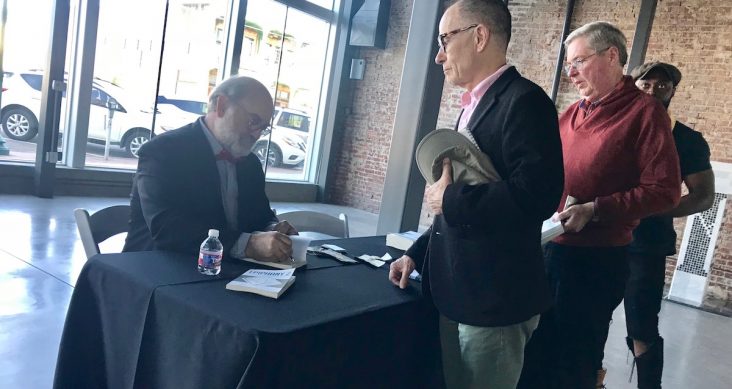‘Decisions today’ key to preparing for jobs that don’t yet exist
by October 28, 2018 1:28 pm 629 views

Futurist Thomas Frey signs books following his lecture Saturday in downtown Fort Smith.
The average human transportation speed in 1850 was four miles per hour. The average reached 24 miles per hour by 1950, and futurist Thomas Frey believes it will be 225 miles per hour by 2050.
That was one of the numerous insights into the future Frey provided to around 120 people who gathered Saturday (Oct. 27) in downtown Fort Smith. Frey’s lecture was part of the Unexpected festival, an event in its fourth year that brings international muralists, musicians and other artists to downtown Fort Smith.
Steve Clark, the founder of the Unexpected and owner of Fort Smith-based Propak Logistics, said a purpose of bringing Frey to Fort Smith was to “provoke one another in terms of how we think” and “reconsider, perhaps, what could be” in terms of cultural and economic development. He said business and civic leaders need to think about how they help “prepare upcoming generations for jobs that don’t exist yet.”
Frey, executive director of the Westminster, Colo.-based DaVinci Institute and a noted futurist lecturer who spent 15 years as an IBM engineer, told the audience there is no set certainty for the future because “our vision of the future continues to morph and change” based on technological advances. The future and the present feed on each other, Frey said.
“If we change somebody’s vision of the future, we change the way they make decisions today,” he said.
The futurist predicts 2 billion jobs will disappear by 2030. He told the Fort Smith crowd the prediction is not a “doom and gloom statement,” but an indicator of how many new jobs will need to be created. For example, once there were 264,000 elevator operators in the U.S., but now there are none. He said no one is lamenting the loss of those jobs because jobs not in existence during the time of elevator operators now exist to fill that loss.
Frey, author of the 2017 book “Epiphany Z: 8 Radical Visions for Transforming Your Future,” believes there are eight broad categories that will result in the next two decades delivering transformative change to every aspect of human life.
• Trillion sensor movement
• Internet of things
• Cryptocurrency-Blockchain
• Drones
Frey said around 2032 there will be one billion active drones. He said drone advancements will challenge governments who have an obligation to protect people and not stand in the way of progress.
• 3D Printing
• Mixed reality devices
• Artificial intelligence (AI)
Scientists have already proven that computers that teach themselves to learn become better than human doctors at predicting heart attacks.
• Driverless technology/automated transportation
Of the eight, Frey believes driverless technology will have the most impact on the planet. He said 128 economic realities will disappear thanks to driverless technology. The car loan industry will all but disappear. People won’t need auto insurance if they depend on driverless cars that can be summoned on demand instead of owning a car. Homes won’t need garages. Also, airports and other entities that rely on parking revenue will have to make significant budget adjustments.
And with 86% of cars on the road having just one person, a majority of future driverless cars will be built for just one person, Frey said. He added that for 120 years vehicles have been built for one purpose: driving. Driverless cars will be built wholly for rider convenience, and are likely to look much different than cars of today.
Following are other future insights Frey shared.
• The mall of the future could be a large warehouse space where different mobile businesses go each day. This will be interesting for the consumer because there will be a new mix each day of businesses.
• There are about 21 billion shoes sold annually and within 5 years, 5% of those will be “smart shoes” that, for example, could alert emergency services if a person falls.
“I think a lot of mom and pop industries are going to pop up out of the woodwork to feed this emerging shoe industry,” Frey said.
• It is a fallacy to say machines will replace humans because machines require humans for development and maintenance. However, Frey said, a large number of people are being replaced by a smaller number of machines.
• There will be a rise of micro colleges that provide “immersive training in a short period of time.” Examples of training provided by micro colleges include drone pilots, brewmaster, and aquaponics.
• There will be 100,000 new microindustries created in the next few decades.
“Every future industry will start as a microindustry,” Frey said.
Rep. George McGill, D-Fort Smith, and Fort Smith mayor-elect was part of the Saturday audience.
“We must have a vision for our future, and we must realize that things change rapidly and we must be nimble if we’re going to stay on the cutting edge of what we want our future to be like,” McGill said when asked about his takeaway from Frey’s lecture.
When asked how he as mayor in a form of government in which the mayor has limited power would push the city to be nimble, McGill said the city must become more consumer-focused and business friendly.
“First of all, I think our city needs to understand who we work for. When we begin to act like a business with an eye on the future, then business will find us, and the future we want will find us,” McGill said.
Prior to beginning his lecture, Frey told the crowd he was “thoroughly impressed” with what he saw in his brief travels around Fort Smith.
“You’ve got a very colorful city here. Very engaging.”
